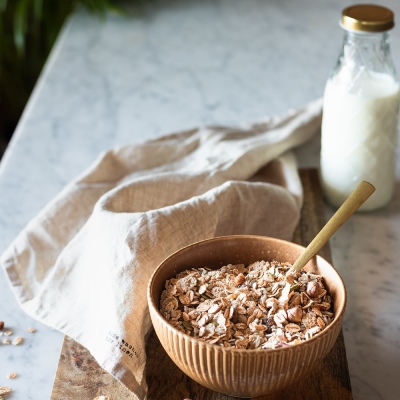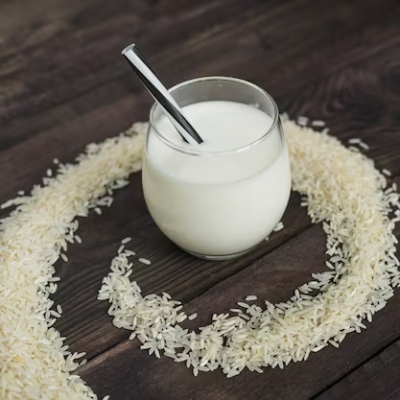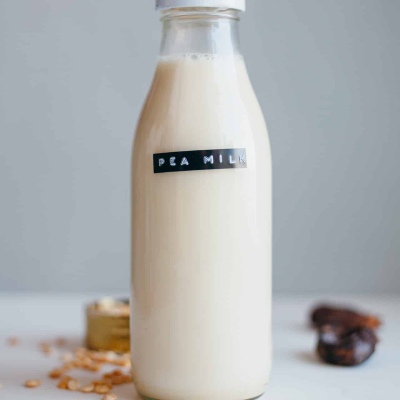Milk has long been an essential in many diets. Some individuals look for alternatives for a variety of reasons, including an allergy to lactose, and dietary preferences. Are you allergic to lactose or interested in learning more about dairy alternatives? You’ve come to the right place. In this blog, we’ll look into the 10 best replacements for milk.
Best replacements for milk
Almond Milk:
Almond milk is a fantastic substitute for regular cow’s milk since it has a creamy consistency and a little nutty flavour. It’s a common option for people who are allergic to lactose or consume no dairy products. Almond milk is produced by blending almonds with water and then filtering off the solids. It has fewer calories and no cholesterol by nature than cow’s milk. It also contains a lot of vitamin E, a powerful antioxidant. Additionally, it enhances skin health. You may include it in everything from smoothies to baked products. You can add it to savoury recipes like curries and also to your daily cereal or coffee.
You may also like: Best 5 Replacements for Ghee
Soy Milk:
The mild flavour and creamy texture of soy milk make it an excellent cow milk substitute. For those looking for a cow’s milk substitute, it is a well-liked choice. To make soy milk, soybeans are mashed, combined with water, and then filtered. It is a good source of protein, which is necessary for the body’s tissue growth and repair. To resemble the nutritional profile of cow’s milk, several manufacturers also supplement their soy milk with vitamins and minerals. Because of this, soy milk is a flexible alternative that may be used for baking and cooking in addition to drinking.
Oat Milk:

Oat milk a naturally sweet flavour and creamy smoothness has made it a popular milk substitute very rapidly. It is prepared by mixing oats and water, and then straining the mixture to remove the solids. Those who want to stay away from dairy or other milk substitutes have a nice choice with it. It’s also a fantastic option for anyone who cannot consume soy or nuts, or who has lactose sensitivity. Vitamins and minerals like calcium and vitamin D are frequently added to oat milk as supplements. As a result, oat milk is a choice that is nutritionally equivalent to cow’s milk. Additionally, its velvety texture makes it an excellent accompaniment to cereal and porridge. Oat milk is a beneficial substitute that complements a variety of dishes with its rich, nutritious flavour. It also gives your food creations a hint of comfort and warmth.
Coconut Milk:
A distinctive and tasty alternative to regular cow’s milk is coconut milk. It is made by mixing water with coconut flesh and then filtering. It provides a rich, somewhat tropical flavour that gives both sweet and savoury recipes depth. People with nut allergies or lactose sensitivity should consider coconut milk. It is also a great option if you want to avoid nuts and dairy. Coconut milk is frequently used in Asian and tropical cuisines, giving curries, soups, and desserts a very rich flavour. Coconut milk is a good source of healthful fats, especially medium-chain triglycerides (MCTs). This substance acts as a quick source of energy since it is quickly absorbed by the body. It is also delicious in smoothies, baked goods, and your morning coffee.
Cashew Milk:
With its unique appeal, cashew milk emerges as a creamy and adaptable substitute for cow’s milk. It is made by combining water and cashews. Smooth and mildly nutty in flavour, cashew milk has a smooth texture. It contains good fats, such as monounsaturated fats, which can help maintain heart health. Cashew milk is frequently commended for its creamy texture. It is a wonderful addition to both sweet and savoury meal ideas. Cashew milk’s mild flavour goes well with a wide range of foods, from enhancing your morning coffee to giving smoothies and soups.
Rice Milk:

A light and adaptable alternative to cow’s milk is rice milk. It has a silky consistency and a subtle flavour. made by mixing water and rice, and then straining the result. Its simple digestion makes it friendly to delicate stomachs, which is one of its main benefits. Due to its natural sweetness, rice milk may naturally sweeten dishes and drinks without dominating the other flavours. It may be used in cereals, smoothies, and various baked items because of its mild flavour. If you’re looking for a drink that is tasty but easy on the stomach, rice milk could be the perfect choice.
Hemp Milk:
Hemp milk, created by combining hemp seeds and water, emerges as a healthy and unique milk substitute. Hemp milk offers a distinctive twist for those looking into cow’s milk substitutes with its mildly nutty flavour and creamy texture. It’s a great option for anyone looking for a plant-based source of omega-3 fatty acids and protein.
Flax Milk:
Traditional cow’s milk can be substituted with flax milk, which is created by combining flax seeds and water. For those who want to eliminate dairy or try different flavours, it’s a fantastic option. Omega-3 fatty acids from plants are known to be present in flax milk. It promotes heart health. It has a moderate flavour that blends nicely with a variety of foods, including cereal, coffee, baking, and cooking.
Pea Milk:

A great milk replacement for people wishing to try something else out is pea milk. It is prepared from yellow peas. Pea milk is a top competitor among plant-based milks since it is frequently high in protein. It has a moderate flavour and may be used to porridge or blended into smoothies, among other things.
Macadamia Milk:
A delicious and creamy alternative to milk is macadamia milk, which is made by combining macadamia nuts with water. The flavour of macadamia milk is rich and almost buttery, giving your meals a touch of richness. It is frequently enriched with vitamins and minerals and is an excellent source of beneficial monounsaturated fats.
The possibilities for replacing milk in your diet are numerous and interesting. These ten milk replacements have you covered if you’re searching for a creamy texture, a distinctive flavour, or certain nutritional advantages. So these milk substitutes bring up a world of options whether you’re eating a bowl of cereal, making a smoothie, or making curry. You’ll learn about the new flavours as you look into these options.
We will be delighted to have your thoughts and feedback. Please write to us at [email protected]
Follow Life and Trendz on Instagram:https://www.instagram.com/lifeandtrendz/
Facebook: https://www.facebook.com/lifeandtrendz
Twitter: https://twitter.com/LifeandTrendz


Comments are closed.